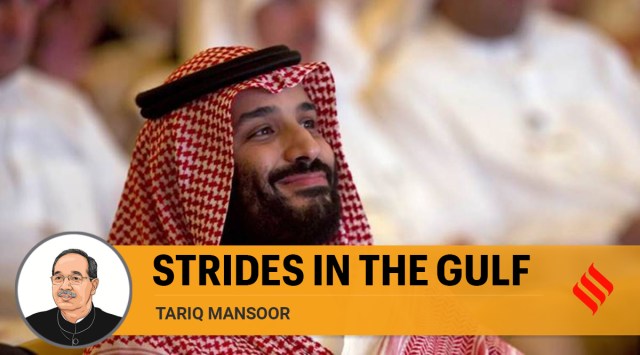
On July 10, this newspaper published a report (‘AMU seeks Centre’s nod to confer degree on Saudi prince Mohammad Bin Salman’, IE) about the Aligarh Muslim University’s (AMU) proposal to confer an honorary Doctor of Letters (D.Litt) degree on the crown prince of Saudi Arabia, Mohammad Bin Salman for his exemplary services to global affairs, and to augment India’s efforts to forge deeper links with the Gulf region.
A few weeks ago, Prime Minister Narendra Modi, in his first overseas visit after completing eight years in office, visited the United Arab Emirates (UAE) to offer condolences on the demise of Sheikh Khalifa bin Zayed Al Nahyan, the former UAE President.
Earlier, speaking at the centenary celebrations programme of AMU in December 2020, PM Modi exhorted the AMU community to further invigorate India’s relations with the Islamic world. He said, “In the last 100 years, AMU has worked to strengthen India’s relations with many countries of the world. The research done here on Urdu, Arabic and Persian languages, on Islamic literature, gives new energy to India’s cultural relations with the entire Islamic world.”
These developments have prompted me to analyse India’s blossoming relations with countries of the Gulf region through a contemporary lens, and review AMU’s role in strengthening India’s links with the region.
PM Modi has surpassed all his predecessors in investing more energy and resources in cultivating ties with the Gulf countries. His efforts stand out on five counts. First, he has put his personal imprint on efforts to improve relations with the region through more than a dozen visits so far. Second, by substantially expanding India’s canvas of engagement — from simple trade-economic-energy relations to strategic relations in the spheres of space technology, defence, counter-terrorism and cyber-security — India’s stake in the security and stability of the region has risen. Third is the cultivation of relationships within the region across binaries vis-à-vis Israel. A testament to this is that while India’s ties with Israel have been on the ascent, PM Modi became the first Indian PM to visit Palestine and receive its highest civilian award in recognition of his “contribution to promote relations between India and Palestine”. Fourth, with the void created by the gradual downsizing of the role of the US in the region, India, for the first time, is being seen as a credible player with a role in the promotion of regional peace and security in the region. The statement of the Prime Minister of Palestine in November 2021, seeking India’s “well-established and distinguished” role in the region, demonstrates this. For a Muslim minority India to be seen as an effective interlocutor in a conservative Muslim region heralds a transformation in the outlook of these countries towards India. Fifth, India’s greater impetus to viewing the Gulf countries as its “maritime neighbours”, has led to the recasting of India’s neighbourhood policy in two ways — “sea” is as important a variable as “land” in as much as “shared values” are as important as “geographical proximity” for a neighbour.
Historically, the AMU has played an important role in augmenting India’s quest for fostering closer ties with the Arab and Islamic world. The extensive network of AMU alumni in every Gulf country, especially in Saudi Arabia and the UAE, has over the years successfully leveraged AMU’s “soft power dividend” in bolstering people-to-people contact. In 2018, when I visited Jubail in Saudi Arabia for an alumni meet, a Saudi national who had graduated from AMU pleasantly surprised me by saying that she intended to name her child “Aligarh” out of affection for AMU.
The prominence and goodwill of AMU has been duly recognised by the political leadership of the Arab and Islamic world. In 1975, Sheikh Zayed bin Sultan Al Nahyan, the first President and founder of the UAE, on his presidential visit to India visited AMU and gave a generous grant for establishing the department of petroleum studies in the university. Over the years, AMU has conferred honorary D.Litt degrees on King Saud bin Abdulaziz (King of Saudi Arabia) in 1955, Obaid bin Saif Al-Nasseri (UAE Petroleum Minister) in 1999, Reza Shah Pahlavi (Shah of Iran) in 1956 and Gamal Abdel Nasser (President of Egypt) in 1960, besides heads of states from Malaysia, the Maldives, Afghanistan, Mauritius, Nigeria, Morocco and Sudan.
Internationalisation of education is a key goal of the National Education Policy (NEP) 2020, as affirmed in the recently concluded Akhil Bharatiya Shiksha Samagam. AMU will strive to play a key role by exploring collaborations with the institutions of the Gulf countries in the frontier areas of innovation, start-ups and entrepreneurship, besides in the classical languages of Urdu, Arabic, Persian and Hindi. The strong Indian diaspora in the Gulf is uniquely placed to vigorously promote Indian higher education institutions in the Gulf as part of the internationalisation of education under NEP.
For its trans-national significance, AMU is recognised as an Institution of National Importance under the Constitution of India. AMU remains committed to strengthening the efforts of PM Modi as India strides forward in the Arab-Gulf world.
The writer is Vice-Chancellor, Aligarh Muslim University